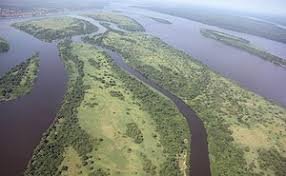The Deepest River in the World: The Discovery of the Congo River
Introduction to the Congo River
The Congo River, located in Central Africa, has recently been identified as the deepest river in the world. This significant discovery highlights the Congo River’s depth, which reaches an astonishing 220 meters (720 feet). This revelation has sparked considerable interest among researchers and has implications for both environmental studies and regional hydrology.
Depth and Measurement of the Congo River
The Congo River’s depth was confirmed by a recent expedition that employed advanced sonar technology. This technology allowed scientists to accurately measure the river’s depth at various points along its length. The Congo River surpasses other major rivers in depth, including the Amazon and the Yangtze, which are also known for their considerable depths but fall short in comparison to the Congo’s maximum recorded depth.
Geographical and Environmental Significance
The Congo River’s depth has significant implications for its ecological system. Its vast depth supports a unique aquatic ecosystem that is home to numerous species of fish, some of which are yet to be discovered. The river’s depth also influences the local climate and weather patterns, affecting both the flora and fauna in the surrounding regions.
Implications for Research and Conservation
Understanding the Congo River’s depth opens up new avenues for scientific research, particularly in the fields of hydrology and environmental science. This discovery is crucial for conservation efforts, as it provides insights into the river’s role in the broader ecosystem. Conservationists are now focusing on protecting this vital water source from threats such as pollution and climate change.

Why This News is Important
Highlighting Environmental Significance
The Congo River’s recognition as the deepest river underscores its environmental importance. Its depth contributes to a unique aquatic environment, which plays a crucial role in maintaining the biodiversity of Central Africa. By understanding the river’s characteristics, scientists can better address conservation needs and protect the delicate ecosystems that depend on it.
Impact on Scientific Research
This discovery has significant implications for scientific research. The Congo River’s depth allows researchers to explore previously inaccessible parts of the riverbed, potentially leading to new discoveries about the river’s geology and hydrology. This enhanced understanding can inform water management strategies and improve our knowledge of global river systems.
Conservation and Management
With the Congo River being a critical resource for millions of people in Central Africa, understanding its depth is vital for effective water management and conservation efforts. Accurate data on the river’s depth can aid in monitoring and mitigating the impact of human activities and environmental changes, ensuring the sustainability of this essential water source.
Historical Context: The Congo River
Early Discoveries and Exploration
The Congo River has been a subject of fascination since early European explorers ventured into Central Africa. Historically, explorers like Henry Morton Stanley were among the first to map the river and document its significance. The Congo River has long been recognized for its size and power, but its depth remained largely unexplored until recent advancements in technology allowed for more precise measurements.
Recent Technological Advances
In recent years, advancements in sonar and underwater imaging technology have enabled scientists to explore the depths of rivers with unprecedented accuracy. The discovery of the Congo River’s depth is a result of these technological innovations, which have revolutionized our understanding of aquatic environments and their characteristics.
Key Takeaways from the Deepest River in the World
| Serial Number | Key Takeaway |
|---|---|
| 1 | The Congo River has been identified as the deepest river in the world, reaching depths of 220 meters (720 feet). |
| 2 | Recent measurements using advanced sonar technology confirmed the Congo River’s depth, surpassing other major rivers like the Amazon and Yangtze. |
| 3 | The river’s depth supports a unique and diverse aquatic ecosystem, crucial for biodiversity in Central Africa. |
| 4 | Understanding the Congo River’s depth has significant implications for scientific research, including studies on hydrology and environmental conservation. |
| 5 | Accurate data on the river’s depth is essential for effective water management and conservation efforts in the region. |
Important FAQs for Students from this News
What is the Congo River known for?
The Congo River is known for being the deepest river in the world, with a maximum depth of 220 meters (720 feet). It also has one of the largest discharge rates among the world’s rivers and supports a diverse aquatic ecosystem.
How was the depth of the Congo River measured?
The depth of the Congo River was measured using advanced sonar technology. This technology allowed scientists to map the riverbed accurately and identify the maximum depth.
Why is the depth of the Congo River significant?
The depth of the Congo River is significant because it influences the river’s unique aquatic ecosystem and affects local climate and weather patterns. Understanding its depth is crucial for scientific research and conservation efforts.
What are the implications of this discovery for conservation?
The discovery of the Congo River’s depth provides valuable insights for conservation efforts. It helps in monitoring the river’s health, addressing pollution, and implementing effective water management strategies to protect the river’s ecosystem.
What technological advancements led to this discovery?
Recent advancements in sonar and underwater imaging technology enabled scientists to measure the Congo River’s depth accurately. These technologies have revolutionized our understanding of aquatic environments.
Some Important Current Affairs Links

















